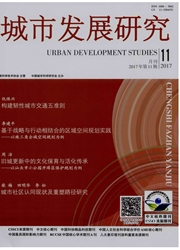

 中文摘要:
中文摘要:
基于《2016年天津市交通与住房调查问卷》数据,从行政区、家庭、职业三个层面,利用核密度估计法、职住平衡指数、空间错位指数等方法刻画天津市中心城区居民职住空间匹配特征,并以居民家庭属性、经济特征、社会制度为切入点分析职住空间匹配特征的影响因素。研究发现,中心城区职住空间匹配程度呈现“区内差异较大,区间差异较小”的特点;其中是否有子女接送、通勤成本以及户籍制度等因素对职住失衡程度影响显著,并且不同家庭与职业类型的职住空间匹配特征呈现较强差异。在此基础上,从公共服务、交通建设与土地利用等方面提出相应对策建议。
 英文摘要:
英文摘要:
Based on Tianjin Traffic and Housing Survey Questionnaire 2016, the paper analyzes the job and housing spatial matching characteristics of Tianjin residents from the administrative, family and occupational three aspects by using the methods of kernel density estimation, job-housing balance index and spatial mismatch index. Then, the paper analyzes the influencing factors of job-housing balance from three aspects: household characteristics, economic characteristics and institutional features. The results show that, the job-housing special match among central area shows convergence characteristics of "the differences within area are large while the differences between areas are small". Among all the influencing factors, whether children need to be picked up, commuting cost and the household registration system are the three most important factors that affecting the job-housing balance of urban residents. Also, the job-housing spatial matching characteristics of different occupation or family types show obvious differences. One these basis, the paper puts forward some suggestions from the aspects of public service, traffic construction and land use.
 同期刊论文项目
同期刊论文项目
 同项目期刊论文
同项目期刊论文
 期刊信息
期刊信息
